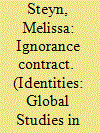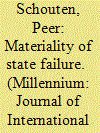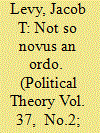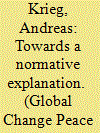| Srl | Item |
| 1 |
ID:
112395


|
|
|
|
|
| Publication |
2012.
|
| Summary/Abstract |
Working with the recollections of everyday experiences of apartheid collected by the Apartheid Archives project, and drawing on the emerging theorization of ignorance in the critical philosophy of race, this article explores how an 'ignorance contract' - the tacit agreement to entertain ignorance - lies at the heart of a society structured in racial hierarchy. Unlike the conventional theorization of ignorance that regards ignorance as a matter of faulty individual cognition, or a collective absence of yet-to-be-acquired knowledge, ignorance is understood as a social achievement with strategic value. The apartheid narratives illustrate that for ignorance to function as social regulation, subjectivities must be formed that are appropriate performers of ignorance, disciplined in cognition, affect and ethics. Both white and black South Africans produced epistemologies of ignorance, although the terms of the contract were set by white society as the group with the dominant power.
|
|
|
|
|
|
|
|
|
|
|
|
|
|
|
|
| 2 |
ID:
123587


|
|
|
|
|
| Publication |
2013.
|
| Summary/Abstract |
Congo's state failure is usually analysed in terms of a 'broken social contract', reflecting the degree to which mainstream understandings of state failure are conditioned by classical social contract theory. This article takes a different route to understanding Congo's predicament by building on insights from actor-network theory (ANT). ANT's insistence on society as a socio-material entanglement, it shows, translates into increasing attention to the role of material infrastructures in constituting governmental power. Conversely, this approach also allows the highlighting of the importance of the absence of the material underpinnings of rule in drawing up more nuanced accounts of state failure.
|
|
|
|
|
|
|
|
|
|
|
|
|
|
|
|
| 3 |
ID:
087434


|
|
|
|
|
| Publication |
2009.
|
| Summary/Abstract |
Social contract theory imagines political societies as resting on a fundamental agreement, adopted at a discrete moment in hypothetical time, that binds individual persons together into a polity and sets fundamental rules regarding that polity's structure and powers. Written constitutions, adopted at real moments in historical time, dictating governmental structures, bounding governmental powers, and entrenching individual rights, look temptingly like social contracts reified. Yet something essential is lost in this slippage between social contract theory and the practice of constitutionalism. Contractarian blinders lead us to look for greater individualism, social unity, and coherence of principles than should be expected. Real constitutional orders appropriate, incorporate, and channel the histories and divisions of the societies they govern. Treating them as social contracts flattens and distorts them, making those engagements with the past or with social plurality appear anomalous and encouraging their minimization. Accordingly this article redirects attention to non-contractarian strands within constitutionalism's intellectual inheritance and lived practice.
|
|
|
|
|
|
|
|
|
|
|
|
|
|
|
|
| 4 |
ID:
125073


|
|
|
|
|
| Publication |
2013.
|
| Summary/Abstract |
The heavy direct or indirect reliance of liberal states on the military and security services of the private contractor in contemporary warfare is an undeniable reality. While the literature presents a wide array of different empirical explanations of why liberal states have come to increasingly rely on contractor support, this paper attempts to give a normative explanation to this development. This paper does not aim to refute the existing explanations but merely complement the most commonly stated reasons for outsourcing. It argues that the liberal state's hiring of private contractors can be understood against the backdrop of a wider trend whereby liberal states, increasingly operating in non-trinitarian operations, attempt to replace the soldier as a trinitarian servant with non-trinitarian means of warfare. This correlation between liberal state commitments in non-trinitarian warfare and a growing employment of non-trinitarian means of warfare can be explained by Social Contract theory and lays the foundation for a normative understanding of why liberal states resort to non-trinitarian contractor support amid non-trinitarian crises.
|
|
|
|
|
|
|
|
|
|
|
|
|
|
|
|